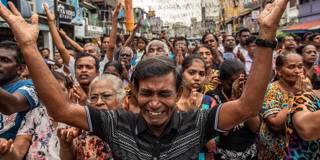There is nothing wrong with nationalism when it is simply a celebration of a country’s best values, traditions, and history. But politicians in Europe and the United States need to be careful that the populist nativism they are stoking does not morph into more violent forms of identity politics, as it has in Christchurch and Sri Lanka.
LONDON – I first visited Sri Lanka as Britain’s development minister in the 1980s, during the early stages of the vicious war between guerrilla fighters – the so-called Liberation Tigers of Tamil Eelam (LTTE) – and Sri Lanka’s armed forces. This bloody ethnic conflict, pitting the largely Hindu Tamil minority against the largely Buddhist Sinhalese majority, surprised those who had previously regarded this beautiful country, with its clever population and its strategic location in South Asia, as a model of Asian democracy. And yet it was here that many of us first heard about suicide bombing, sometimes carried out by children.

LONDON – I first visited Sri Lanka as Britain’s development minister in the 1980s, during the early stages of the vicious war between guerrilla fighters – the so-called Liberation Tigers of Tamil Eelam (LTTE) – and Sri Lanka’s armed forces. This bloody ethnic conflict, pitting the largely Hindu Tamil minority against the largely Buddhist Sinhalese majority, surprised those who had previously regarded this beautiful country, with its clever population and its strategic location in South Asia, as a model of Asian democracy. And yet it was here that many of us first heard about suicide bombing, sometimes carried out by children.